“Crowdsourceress” Alex Daly on Getting Funded, Burning Out, and Setting Boundaries
June 01, 2018 | Filed in: Woman of the Week
Former journalist Alex Daly discovered her magic touch for crowdfunding almost by accident. Six years and $20 million later, she has become known as “The Crowdsourceress”—a fundraising whiz who regularly convinces thousands of people around the world to finance her clients’ projects through online platforms like Kickstarter and Indiegogo. (She also wrote a book on the subject, fittingly titled The Crowdsourceress: Get Smart, Get Funded, and Kickstart Your Next Big Idea.) Here, the Vann Alexandra founder discusses setting boundaries at work, hitting rock bottom, and the importance of spending a weekend in the pool.
I STARTED MY CAREER in journalism and documentary filmmaking, which led me to crowdfunding because most documentaries need to raise money to get made. I did a couple of Kickstarter campaigns for films that I was helping to produce, and then people started asking me to do it for other films, too. I realized I was onto something in 2014 when Neil Young’s team approached me to crowdfund for a project he was working on. The goal was $800,000, which was ten times the amount I had ever raised before. I was still a newbie, doing it as a side gig; I had maybe ten campaigns under my belt. When I got that job, I threw myself into it, working 24 hours a day. I couldn’t even wrap my head around how terrifying the dollar amount was. When the campaign launched, we hit the goal on the first day. People from around the world believed in the story we were telling, and wanted to be a part of it—it was such a rush.
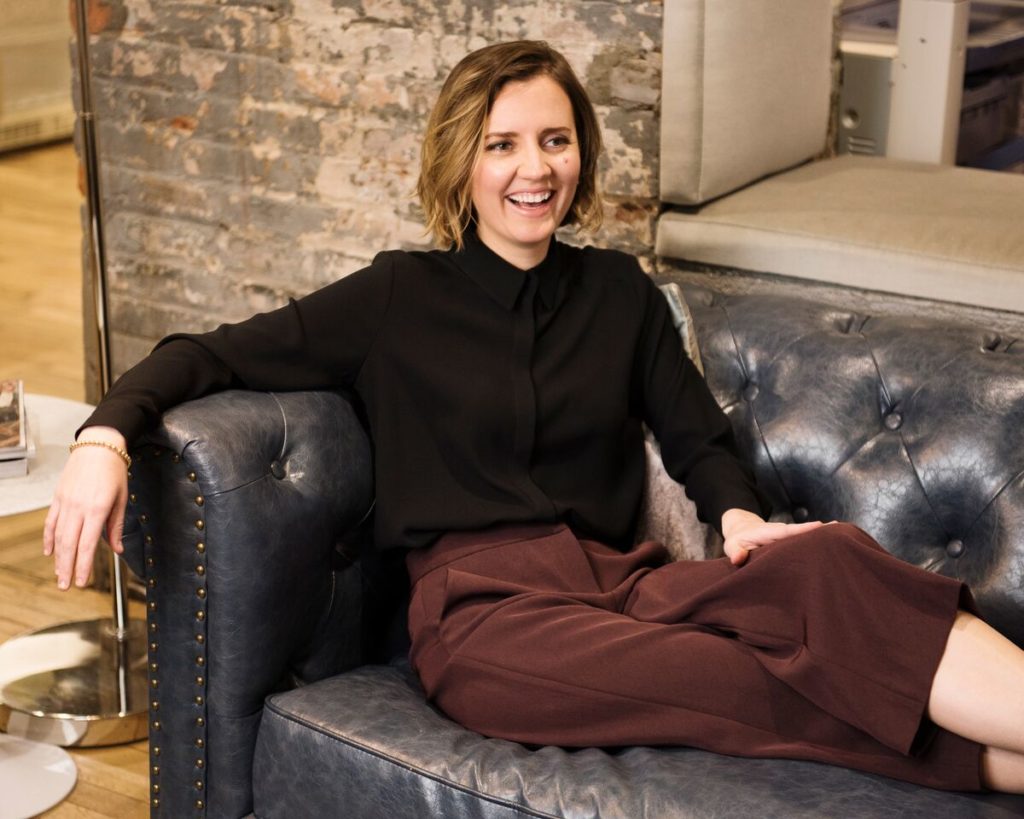
Alex wears the Lagarde shirt in black and the Pippa pant in raisin.
AFTER THAT CAMPAIGN ENDED, we got rave reviews about how the Kickstarter was handled. Time magazine said that it was one of the most artfully managed campaigns ever. All that hard work translated into something so big and powerful, and I was hooked.
WHEN I DECIDED TO MANAGE CAMPAIGNS FULL TIME, it wasn’t very formal or considered at all. I didn’t write a business plan, or any plan for that matter. I just opened a bank account, put in the money I had just made from the Neil Young project, got a desk in this old warehouse in Greenpoint, and hired a part-time freelancer. The overwhelming confidence I felt after that campaign made me feel like I could take on anything.
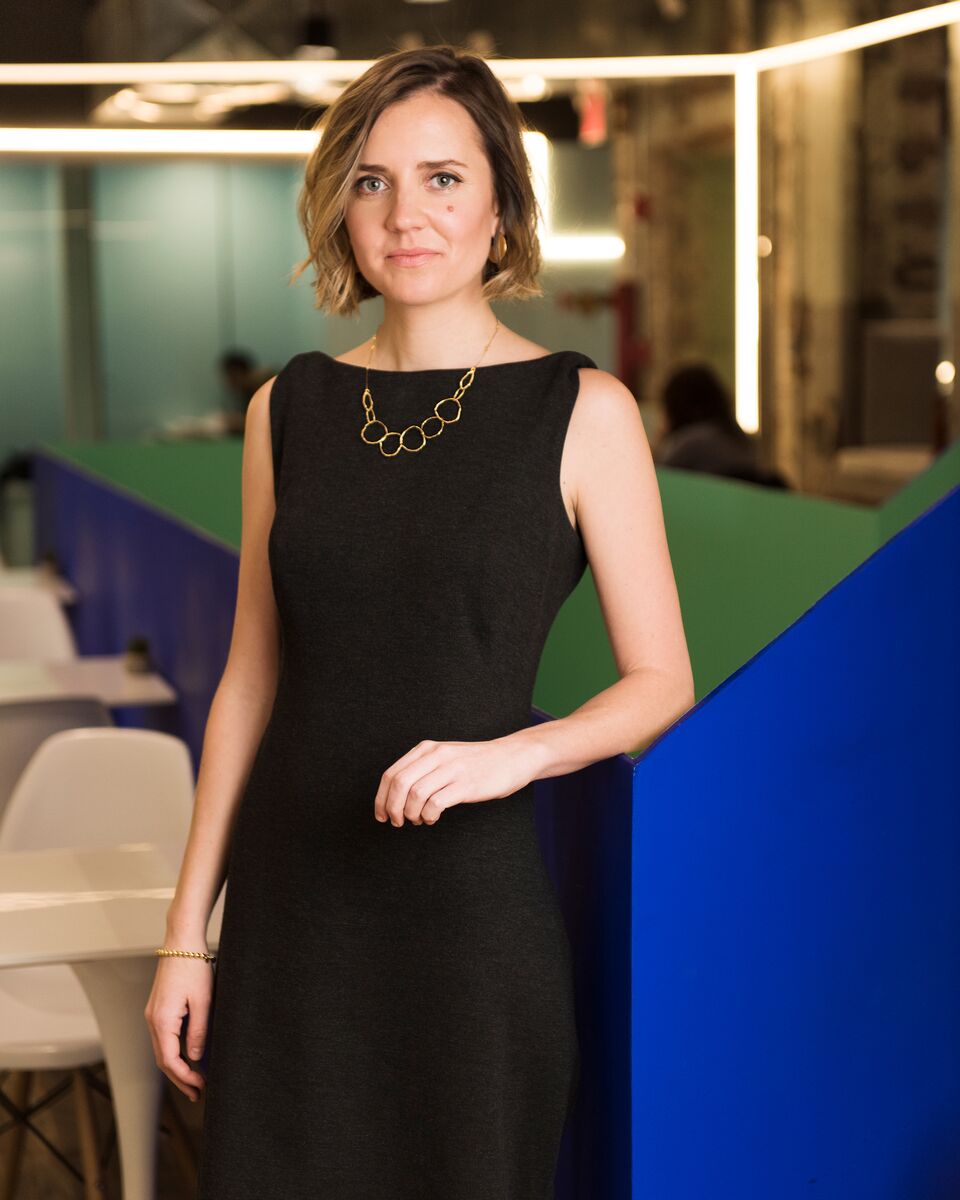
Alex wears the Lydia dress in cinder and the Helene necklace.
AT FIRST, I FELT LIKE I HAD TO SAY YES to every opportunity, and that put me on some rocky terrain. I wound up dealing with some very challenging partners who treated me like a punching bag. Now, a few years in, when prospective clients are in the first stages with us, sending us proposals and talking on the phone, I can tell if somebody’s asking for too much. I can gauge it either from their tone, or if they say something like, “Yeah, we’re going to raise $20 million, and if we go any lower it’s a failure.” In the past, I would have said, “Oh yeah, we can try to do that.” But these days, I’d rather say no to a big paycheck and maintain a positive working environment for myself and my team.
I THINK IT’S BEST TO HAVE TOUGH CONVERSATIONS EARLY. If somebody reaches out about a project and their goals seem unrealistic, I’ll be honest with them. I’ll say, “This has nothing to do with you or your product, and I know it’s your baby, but based on my experience and the crowdfunding landscape, I think that this goal would be more realistic. Would you consider that amount to be a failure?” Managing expectations is hard, but it’s essential. If we’re not aligned, then I’d rather just stop there and try to find a different partner. A partnership functions much better when you’re both working towards the same goal, together.

Alex wears the Peggy top in ivory, the Dietrich jacket in black, and the Henrietta earrings.
MY PARENTS WERE BOTH ENTREPRENEURS. My dad was in the Olympics for swimming in 1976, in Montreal. After that, he didn’t have any job experience, but he bought himself a computer and taught himself how to program, and then created a company that made software to detect money laundering in banks and financial institutions. Meanwhile, my mom started a marketing company for radio and TV stations. My mom’s team was about 10 people, and my dad’s team was about 20 or 30. So I grew up watching them. What’s funny is that my dad worked in finance and my mom worked in marketing, and now I do fundraising, which is a blend of finance and marketing. It’s a massive privilege to be able to call them anytime with questions, from “What does this thing in the contract mean?” to “How do I deal with this client?”
ONE THING I AM VERY GOOD AT is asking questions. I have no qualms about revealing what I don’t know. I’m not afraid to take a bunch of people out to dinner and say, “What do you think about this?” Or “What can I do next?” Leaning on industry experts to help me take the company to the next level has been very important.
I DEFINITELY DEALT WITH AGEISM early on, and was easily cowed. I was young—in my twenties—and pretty inexperienced. When a client said, “We should do it this way,” I would cave. But now that we have numbers behind us, and over 70 campaigns with high success rates, I just don’t deal with that bullshit anymore.
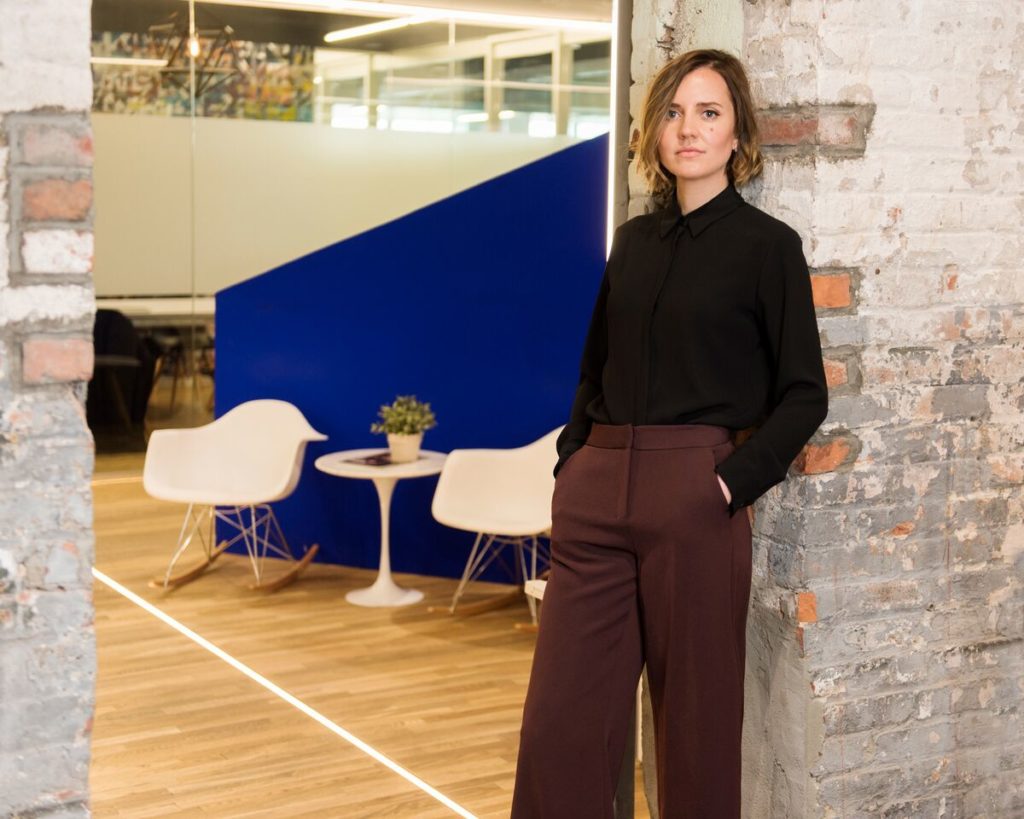
Alex wears the Lagarde shirt in black and the Pippa pant in raisin.
I WENT THROUGH A MASSIVE BURNOUT IN 2016. I thought I wanted to close the company. For the two years prior, I’d had my hands in everything—I was the only person writing, pitching, and talking to clients—and I felt so overwhelmed and depleted. So I got a business coach, because I needed to learn how to delegate. I also made the decision to work with nicer clients, and vet them very early.
WE NOT ONLY CHANGED THE STRUCTURE of how we work, we changed the structure of our actual campaigns. I got the idea to do so when I was hitting rock bottom. I went down to Miami, where my family is from, just to take a breather for a weekend. It was during that moment of quiet that I realized we didn’t need to manage campaigns from start to finish, the way we had been doing—we could step out for the two weeks in the middle. No matter what, a campaign always plateaus during that time; it’s just the natural funding curve, and there was no point tearing our hair out and wasting resources trying to disrupt it. Thank goodness for that weekend in the pool—it changed our business, and my life. After that, we had a much better year financially. We were taking on more projects, but leaving the office at 6:00 p.m. We created a healthier dynamic that turned out to be more profitable, too. But it took me almost crashing and burning to realize that things had to change.
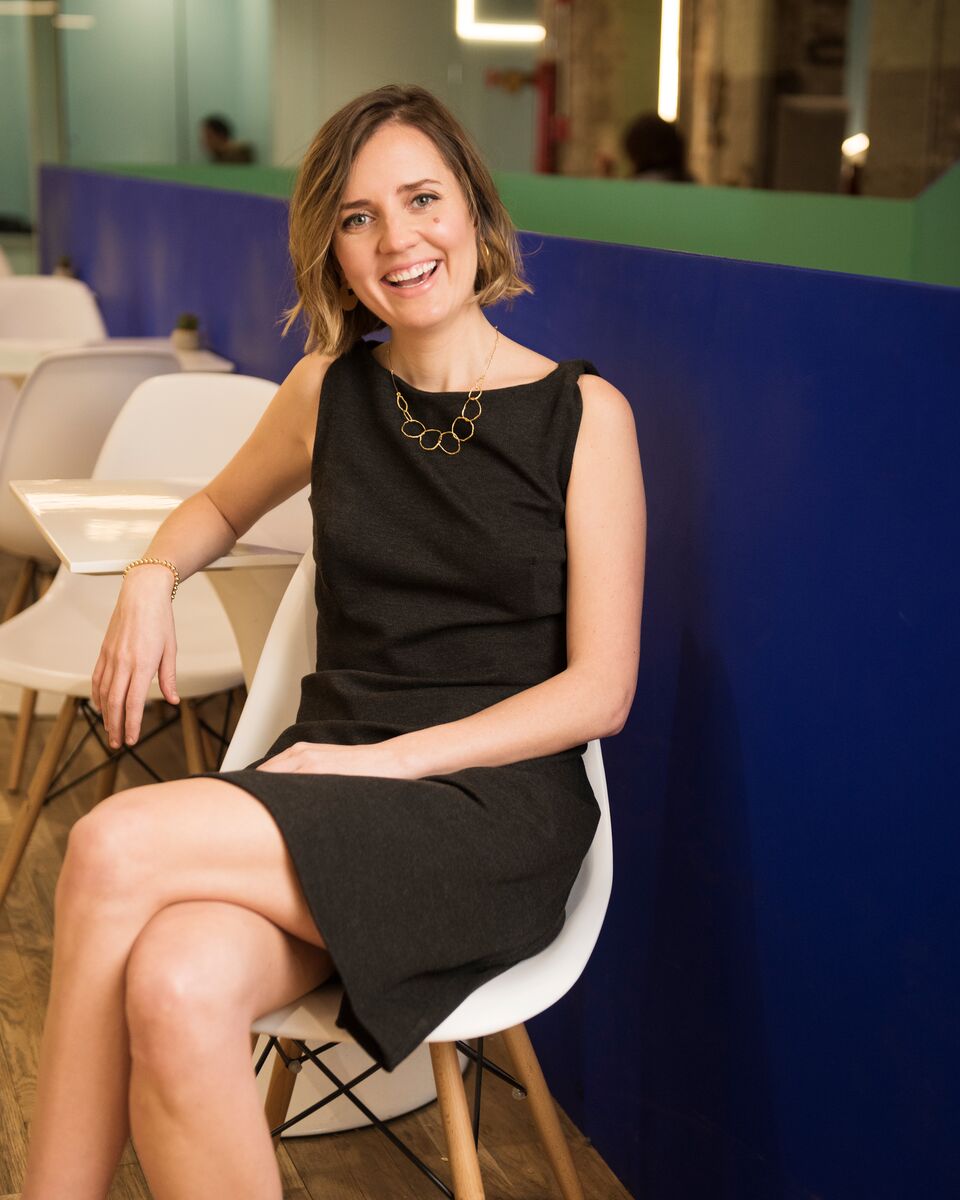
Alex wears the Lydia dress in cinder and the Helene necklace.
ESTABLISHING WORK BOUNDARIES has been another big change. I used to have so much anxiety that I would wake up in the middle of the night and answer emails. Now, I don’t keep my phone in the bedroom anymore. I don’t read emails after 8:30 p.m. or before 8:00 a.m. I have a strict policy for my team of no work on the weekends—although sometimes I break that rule. I even have it in our client contracts that these are our work hours, and if you email or call outside of them, we’ll only get back to you within those hours.
ANOTHER IMPORTANT ASPECT OF GROWING our business was trusting my team more. I hired a project manager, and we keep a list of to-dos for each day. Leaving at a decent hour requires discipline. Before, it always felt like the projects were one step ahead of me. Now, we’re one step ahead of the projects.
AFTER MY BOOK CAME OUT, it was an interesting transition to go from marketing other people to marketing myself. Calling myself “The Crowdsourceress” has always made me feel a little bashful, but when I was on my book tour, I thought, I should own this, and be proud of it. Having a spotlight on the work I had been doing so furiously for the past few years was nice, and I let myself enjoy it. And then, after that month, I thought, Time to go back behind the scenes.
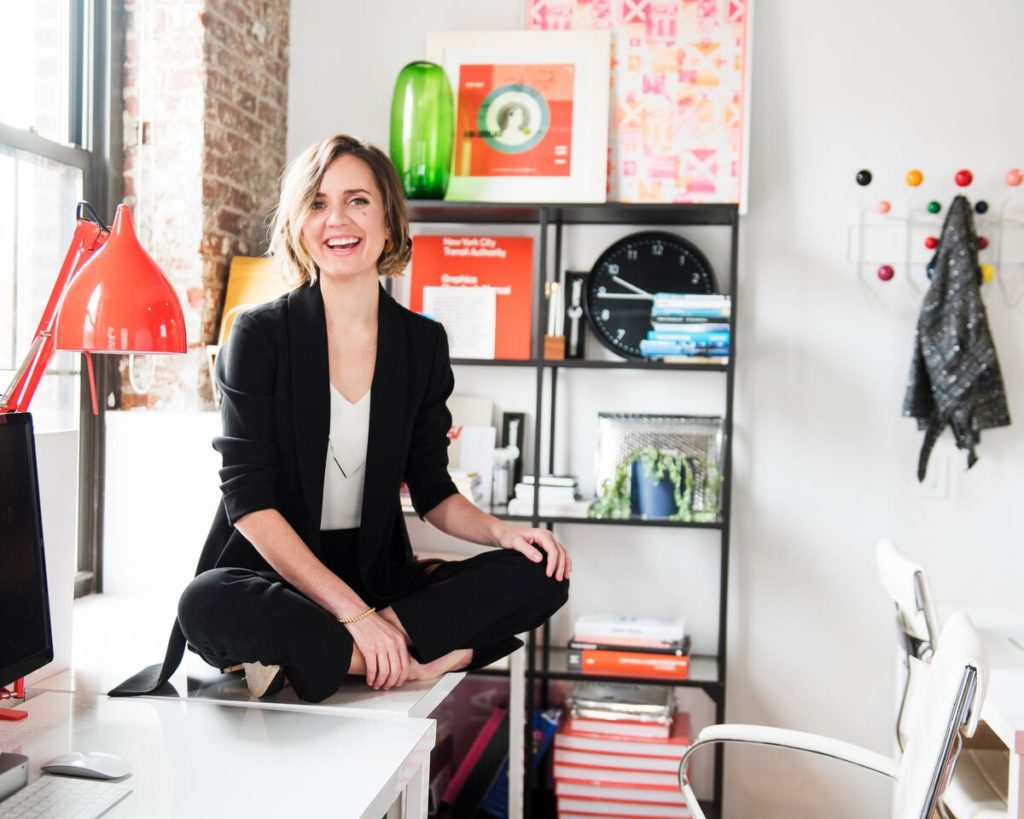
Alex wears the Peggy top in ivory, the Dietrich jacket in black, and the Henrietta earrings.
THIS MIGHT SOUND NEUROTIC, but we enacted a clean desk policy, so that everyone’s desks are cleared by the end of the day. I think that when you start the morning with a clean desk, you feel like you’re ready to go. We’re really proud of our office space, too. It’s homey and cozy, and I think that’s a big element of feeling good at work. All I have on my desk is a mug with pens in it, and my computer and notebook. If there are any extra pieces of paper that I need to review, I put them in my notebook on the corner of my desk, so it looks tidy. I’m not a naturally organized person, but this pushes me to act like one.
EVERY MORNING, I DO A SHORT, HIGH-INTENSITY WORKOUT. I used to get bored by exercise, but now I do these 17-minute routines that include sprints on the treadmill, jump-rope, and weights. It gives me such a burst of energy. Then, after I take a shower, I always blow-dry my hair. It sounds like a small thing, but I used to run out the door with wet hair, and I’ve realized that I feel much more put-together when my hair is dry. I also try to dress nicely for the office. My own presentation, as well as our office’s presentation, makes me feel good when I start work every day.
Photographs by Matthew Priestley.





